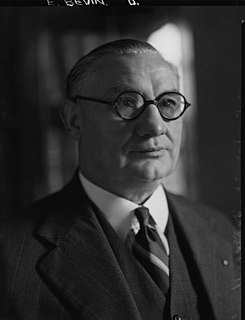A Quote by Plato
The qualities which a man seeks in his beloved are those characteristics of his own soul, whether he knows it or not.
Related Quotes
The psychological impotence of our enraged generation must be traced to the overwhelming accusation of insincerity which every man and woman has to confront, in the depths of his own soul, when he seeks to love merely for his own pleasure.And yet the men of our time do not love with enough courage to risk even discomfort or inconvenience.
It is God's earth out of which man is taken. From it he has his body. His body belongs to his essential being. Man's body is not his prison, his shell his exterior, but man himself. Man does not "have" a body; he does not "have" a soul; rather he "is" body and soul. Man in the beginning is really his body. He is one. He is his body, as Christ is completely his body, as the Church is the body of Christ
The master in the art of living makes little distinction between his work and his play, his labor and his leisure, his mind and his body, his information and his recreation, his love and his religion. He hardly knows which is which. He simply pursues his vision of excellence at whatever he does, leaving others to decide whether he is working or playing. To him he's always doing both.
There are three kinds of love;
unselfish, mutual, and selfish.
The unselfish love is of the highest kind;
The lover only minds the welfare of the beloved and does not care for his own sufferings.
In mutual love the lover not only wants the happiness of his beloved;
but has an eye towards his own happiness also. It is middling.
The selfish love is the lowest. It only looks towards its own happiness,
no matter whether the beloved suffers weal or woe.
Each particular being, in its individuality, its concrete nature and entity, with all its own characteristics and its private qualities and its own inviolable identity, gives glory to God by being precisely what He wants it to be here and now, in the circumstances ordained for it by His Love and His infinite Art.
Man with all his noble qualities, with sympathy which feels for the most debased, with benevolence which extends not only to other men but to the humblest living creature, with his god-like intellect which has penetrated into the movements and constitution of the solar system- with all these exalted powers- Man still bears in his bodily frame the indelible stamp of his lowly origin.
The world of men has forgotten the joys of silence, the peace of solitude, which is necessary, to some extent, for the fullness of human living. Man cannot be happy for long unless he is in contact with the springs of spiritual life which are hidden in the depths of his own soul. If man is exiled constantly from his own home, locked out of his spiritual solitude, he ceases to be a true person.





































